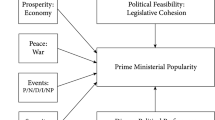Summary
This paper reports on the results of an empirical study of relationships between the popularity of US presidents and economic variables. Traditionally, these relationships are based on the hypothesis that voters hold the incumbent President responsible for the economic situation. We derive an alternative specification of popularity, based on the hypothesis that political parties perform better on different issues. Empirical evidence turns out to be strongly in favour of our hypothesis. Our findings have important implications for studies on government behaviour in which it is assumed that one of the objectives of administrations is to maximise votes.
Similar content being viewed by others
References
Beck, N., ‘Parties, Administrations, and American Macroeconomic Outcomes,’American Political Science Review, LXXVI (1982), pp. 82–93.
Borooah, V.K. and F. van der Ploeg, ‘The Changing Criteria of Economic Success: Performance and Popularity in British Politics,’Manchester School of Economic and Social Studies, LIX (1982), pp. 61–78.
Chappell, H. W., ‘Presidential Popularity and Macroeconomic Performance: Are Voters Really so Naive,’Review of Economics and Statistics, LXV (1983), pp. 385–392.
Edwards, G.C. III, The Public Presidency, New York, 1983.
Fair, R.C., ‘The Effect of Economic Events on Votes for President,’Review of Economics and Statistics, LX (1978), pp. 159–173.
Frey, B.S. and F. Schneider, ‘A Politico-economic Model of the United Kingdom,’Economic Journal, LXXVIII (1978a), pp. 243–253.
Frey, B.S. and F. Schneider, ‘An Empirical Study of Politico-Economic Interaction in the United States,’Review of Economics and Statistics, LX (1978b), pp. 172–183.
Goodhart, C.A.E. and R.J. Bhansali, ‘Political Economy,’Political Studies, XVIII (1971), pp. 43–106.
Hanushek, E.A. and J.E. Jackson,Statistical Methods for Social Scientists, London, 1977.
Hibbs, D., ‘Political Parties and Macro-economic Policy,’American Political Science Review, LXXI (1977), pp. 1467–1487.
Hibbs, D.A., ‘On the Demand for Economic Outcomes: Macroeconomic Performance and Mass Political Support in the United States, Great Britain and Germany,’Journal of Politics, XLIV (1982), pp. 426–461.
Hibbs, D.A. Jr., ‘Political Parties and Macroeconomic Policies and Outcomes in the United States,’American Economic Review, LXXVI (1986), pp. 66–70.
Kramer, G.H., ‘Short-term Fluctuations in U.S. Voting Behaviour, 1986–1964,’American Political Science Review, LXV (1971), pp. 131–143.
MacRae, C.D., ‘A Political Model of the Business Cycle,’Journal of Political Economy, LXXXV (1981), pp. 239–263.
MacRae, D.C., ‘On the Political Business Cycle,’ in: D.A. Hibbs and H. Fassbender (eds.),Contempory Political Economy, Amsterdam, 1981.
Meltzer, A.N. and M. Vellrath, ‘The Effects of Economic Policies on Votes for the Presidency: Some Evidence from Recent Elections,’Journal of Law and Economics, XVIII (1975), pp. 781–798.
Mosley, P.,The Making of Economic Policy, Brighthon, 1984.
Mueller, J., ‘Presidential Popularity from Truman to Johnson,’American Political Science Review, LXIV (1970), pp. 18–34.
Paldam, M. ‘A Preliminary Survey of the Theories and Findings of Vote and Popularity Functions,’European Journal of Political Research, IX (1981), pp. 181–199.
Peeperkorn, L.P.M. and T.B.M. Steenkamp, ‘Regeringspopulariteit en economische omstandigheden,’Maandschrift Economie, L (1986), pp. 85–98.
Renaud, P.S.A. and F.A.A.M. van Winden, ‘On the Importance of Elections and Ideology for Government Policy in a Multi-party System,’ in: M.J. Holler (ed.),The Logic of Multiparty Systems, Dordrecht, 1987.
Swank, O.H., ‘De invloed van economische variabelen op verkiezingen,’Economisch Statistische Berichten, LXXIV (1989), pp. 820–823.
Theil, H.,Economic Forecasts and Policy, Amsterdam, 1958.
Winden, F.A.A.M. van,On the Interaction Between State and Private Sector, Amsterdam, 1983.
Author information
Authors and Affiliations
Additional information
I am indebted to J.C. Siebrand, A.S. Brandsma, G.E. Hebbink, N. van der Windt and an anonymous referee for many useful suggestions.
Rights and permissions
About this article
Cite this article
Swank, O.H. Presidential popularity and reputation. De Economist 138, 168–180 (1990). https://doi.org/10.1007/BF01329989
Issue Date:
DOI: https://doi.org/10.1007/BF01329989




